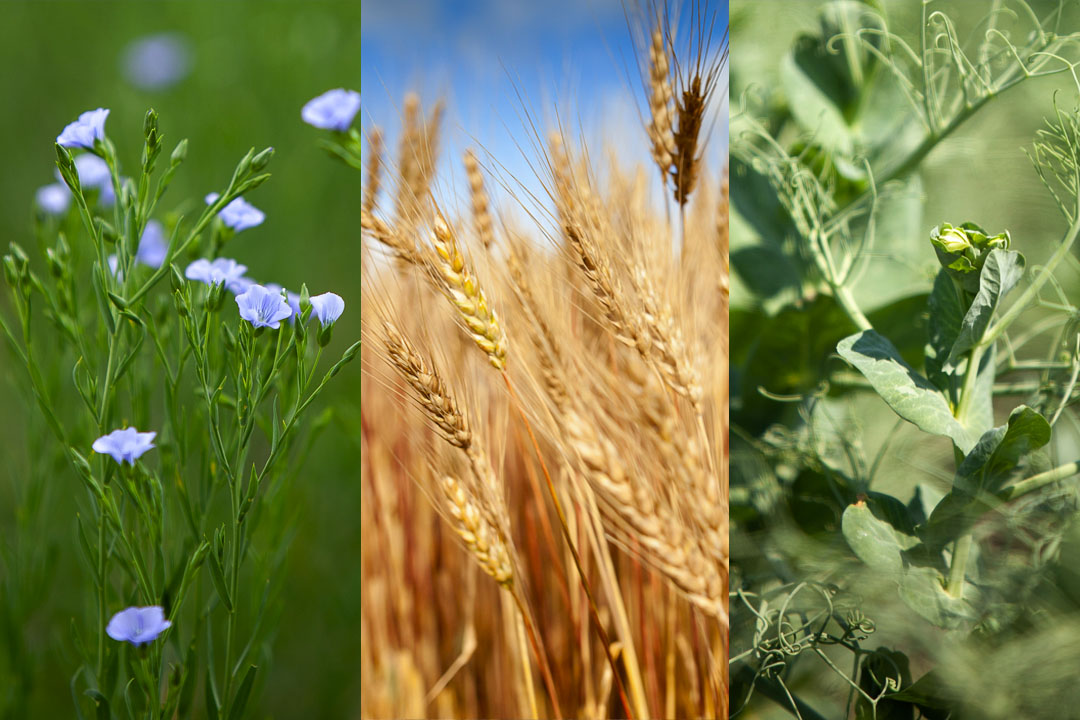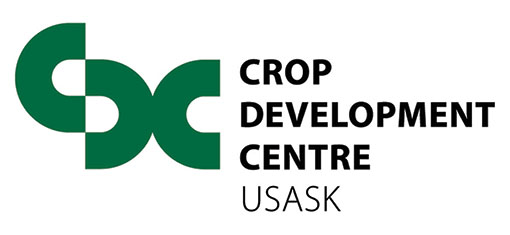
Crop Development Centre launching new look to celebrate a half century of success
The Crop Development Centre (CDC) at the University of Saskatchewan (USask) is a powerhouse of research that’s propelled Canadian agriculture forward for five decades—and it shows no signs of slowing.
By Nykole KingFor 50 years, the CDC has developed seeds of new varieties that become the crops of tomorrow. For every seed variety, scientists are keenly aware it can take 10 to 12 years of rigorous testing before it’s planted in a farmer’s field.
Always keeping “an eye to the future” is what Dr. Curtis Pozniak (PhD), the director of the CDC, credits to the success of the CDC’s research and seed breeding operations. Even while celebrating the major milestone year, Pozniak and his team are planning for the next half century and positioning the CDC as a world-class research centre by launching a rebrand.
“The idea to rebrand the CDC is to celebrate our connections, our history and our people, but also to look to the future, and better position and communicate the importance of the work we do,” says Pozniak.
The CDC is a field crop research centre founded in 1971 under the Department of Plant Sciences in the College of Agriculture and Bioresources. The CDC is an integrated centre within the Department of Plant Sciences and works closely with stakeholders and industry partners to develop profitable seed varieties that are particularly suited to withstand the harsh prairie climate.
At the CDC, scientists and field technicians develop commercially successful and diverse varieties of bread wheat, durum, barley, oats, flax, field peas, lentils, chickpeas, canary seed and dry beans. More recently, the CDC has expanded its activities and developed new forage varieties to support a growing livestock sector. The centre has produced more than 500 seed varieties to date, which are sought out by producers across the world.
Researching crop improvement is only part of the CDC’s operations. Marissa Janssen is the manager of the CDC, and much of what she does is handling the licencing agreements to sell seed to producers. Janssen has been working with Pozniak on the rebrand, which she hopes will bridge the research and the business side to bolster the profile of the CDC.
“Overall, my goal is to raise awareness of the work of the CDC, particularly during the 50th year, but also beyond that. We have so much to celebrate; our past, our people and our future. It is timely to highlight the excellent research that we do and to use our success to really build more brand recognition,” says Janssen. “We've done a great job and I think we can continue on that … and really set the CDC up for another 50 years of success.”
The launch of the rebranding will take place this fall. The rebrand includes a new CDC logo and the launch of a redesigned website and social media channels.
“We know who we are, and we are proud of our accomplishments. Our new branding and communications strategy will allow us to talk about our research in a way that people understand and to bring it more to life for people,” says Janssen.
According to a 2016 economic assessment, for every dollar invested into the CDC it results in a return of $12 to the economy. The goal with rebranding is to raise its profile as a research organization—one that is a key contributor to the local, regional, and national economy. It will be an ongoing task to better communicate with the public, especially to urban dwellers, just how vital the CDC’s operations are to food production in Canada.
“There are a lot of people that know exactly what we do, but there are also many that have little idea of the importance of crop breeding and research. I think that is one part of what we want to focus on in the next few years—reaching the urban dwellers group because it's important that people know what we do,” says Janssen. “We create the seed varieties for farmers around the world to grow into safe, nutritious food.”
The research operations of the CDC are diverse, from crop breeding, developing disease and pest resistance into the seeds they produce, deciphering the nutrition and user-quality of new varieties to genomic research of sequencing crop DNA. Pozniak says that the CDC’s priority will remain the profitability and sustainability of producers and the ag sector, which is why CDC scientists work together with researchers at the College of Agriculture and Bioresources to implement sustainable production systems.

An eye to the future
Moving into the future, Pozniak says that supporting sustainable production systems through variety development will continue to be a priority, along with consumer’s needs of nutritional quality and the growing threat of extreme climate and weather.
“New varieties must meet the needs of growers and the agronomic systems they use to realize the potential of those varieties. The strength of the CDC has been, and will continue to be, our collaborations across an array of disciplines in the Department of Plant Sciences, the college, and the university. Things like research into agronomy, digital agriculture, stress physiology—these are all really important to help CDC research develop resilient varieties for the future,” says Pozniak.
The success of the CDC also comes from collaborating with partners with diverse perspectives across the value chain so that their work has greater global impact, explains Pozniak. It also allows them to keep a balanced funding portfolio.
“It has always been and will remain our strategy to work with a number of stakeholders from across the value chain. Each group has a very different perspective of the industry but when you actually bring them together, the whole is greater than the sum of its parts,” says Pozniak.
The milestone marks a distinct new phase in the research organization’s history, in raising its profile and recognition as a world-class research centre that’s tackling the most pressing issues in food security, health and sustainability.
“The CDC is a tremendously successful organization, and I hope to see that the CDC becomes even more internationally recognized as a leader in crop research, and really a household name across the country,” says Janssen. “I think it absolutely can be, and that's what I hope for the CDC.”
Visit the new CDC website cdc.usask.ca and twitter account @CDC_USask.

